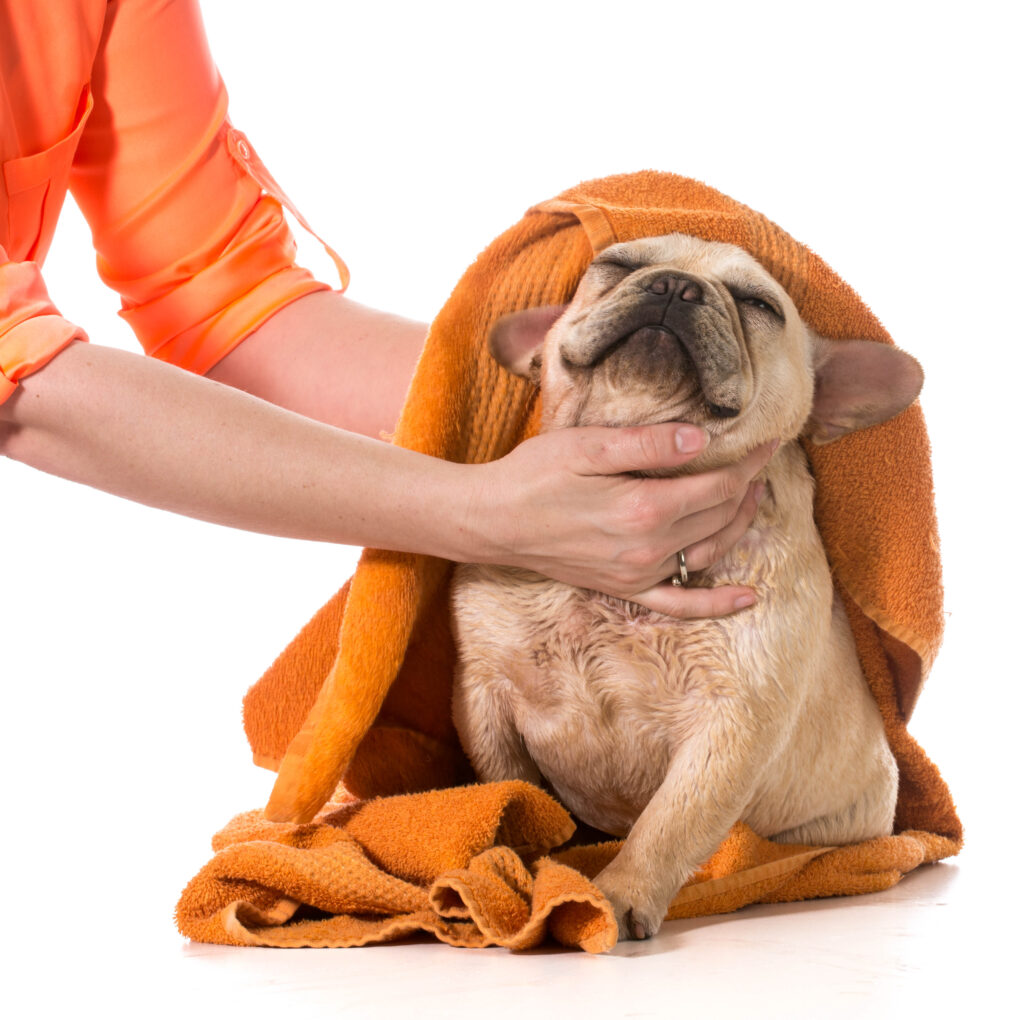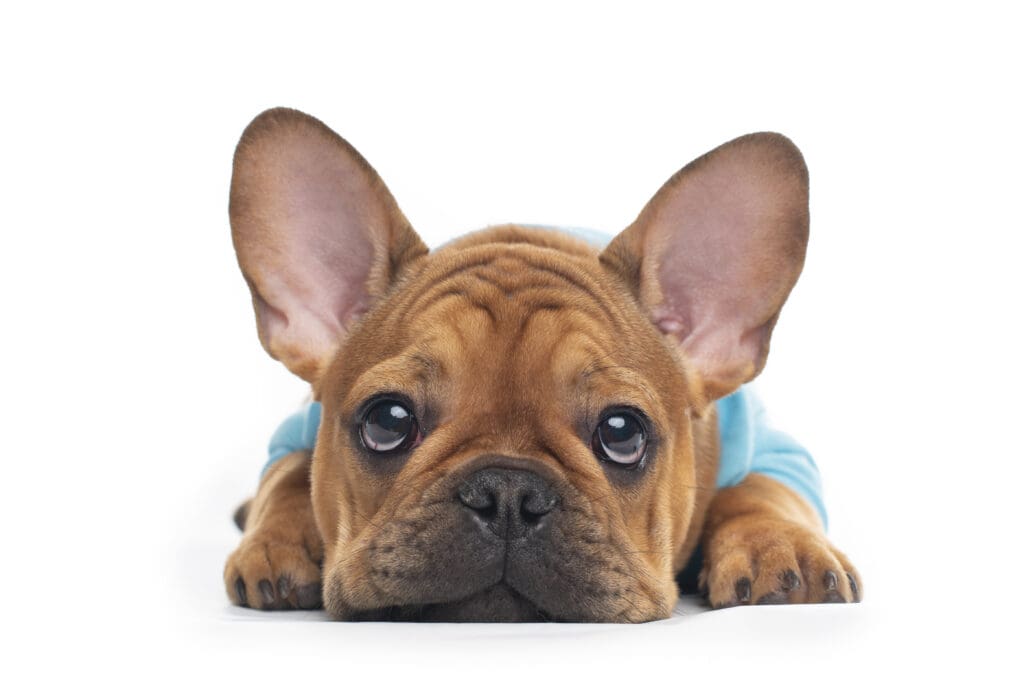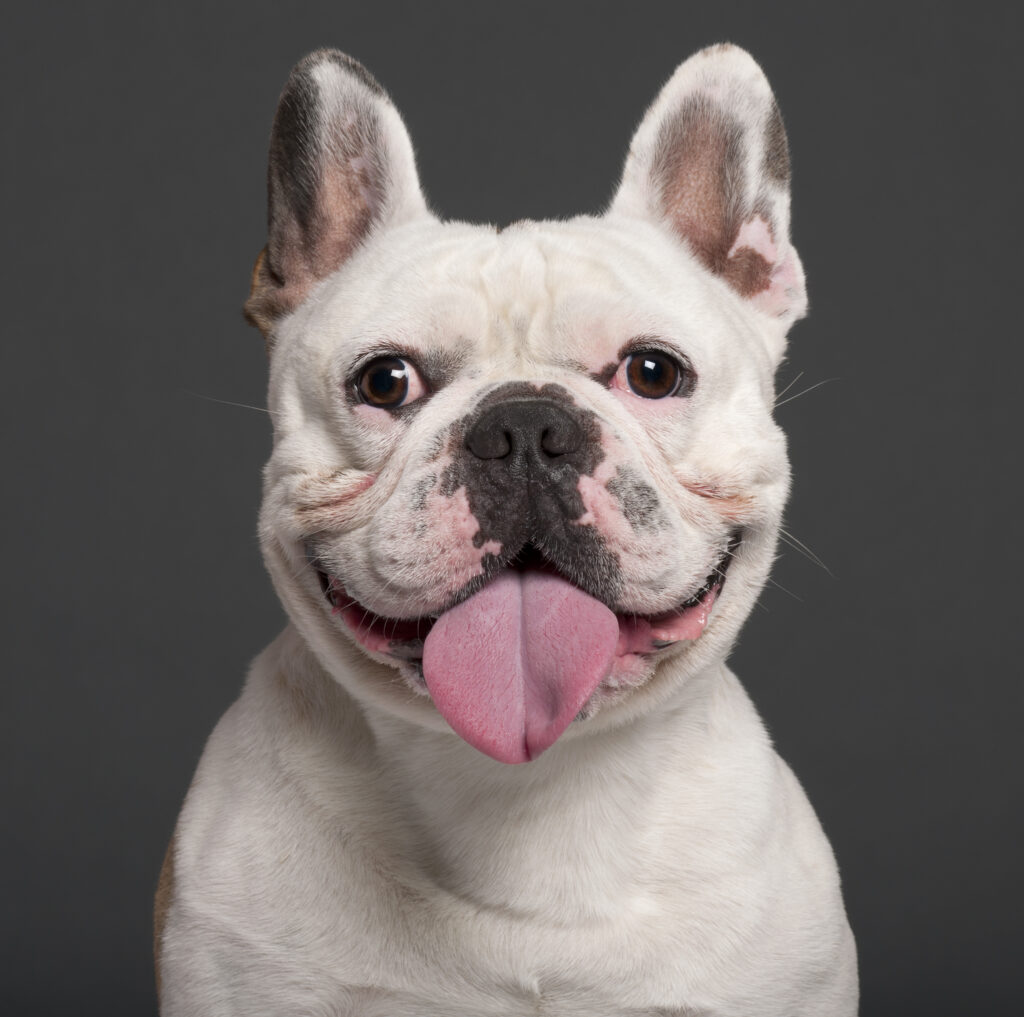Our website is supported by our users. We sometimes earn money when you click an affiliate link and make a purchase. This is at no extra cost to you and helps us to create quality content. Thank you for your support. For all that have shown us such wonderful support, we thank you from the bottom of our hearts!
The French Bulldog is a popular small-dog breed, known for its playful, smart, and adaptable nature.
With its unique large bat ears and short coat, this distinctive breed has captured the hearts of dog lovers everywhere.
As you explore the world of French Bulldogs, you’ll learn about their history, health, grooming, training, and care tips to better understand and appreciate these charming companions.

Originating in France in the mid-nineteenth century, the French Bulldog boasts a rich history and has enjoyed popularity not only in its homeland but also in the United States.
With a muscular frame and an endearing, bat-like face, Frenchies, as they are affectionately known, are the epitome of a small, sturdy dog.
As pet owners, it’s important to be vigilant about potential health problems and have a solid understanding of proper care to ensure a long, healthy life for your Frenchie.
In terms of personality, this breed is a wonderful mix of both affectionate and independent traits, making them fantastic companions for many types of households.
However, as with any breed, training, discipline, and patience are essential to bringing out the best in their temperament.
By providing a stable and nurturing environment, you will soon discover why the French Bulldog is such a beloved addition to any family.
History of the French Bulldog
The French Bulldog traces its roots to three countries: England, France, and America.
It all began in England when lace workers from Nottingham, known for their affinity towards smaller-sized bulldogs, migrated to Normandy, France, during the mid-1800s.
These lace workers brought along their toy bulldogs, which became popular among the locals.
As these small bulldogs began to mix with the local Parisian ratters, they eventually evolved into a distinct breed, known today as the French Bulldog.
The transformation from small bulldogs to the “French” type was heavily influenced by breeders in France.
Although French Bulldogs had been imported by Americans for some time, the purpose of their importation was not to establish an American-based breeding program until the late 1800s.
The breed soon caught the attention of high society in both France and the United States.
The breed’s popularity grew exponentially, and it wasn’t long before the first breed clubs were formed. In the 1980s, the French Bull Dog Club of America, energized by younger breeders, took on a more proactive role in promoting the breed, contributing to a significant increase in Frenchie registrations.
In America, breeders played a crucial part in defining the breed standard, particularly the signature “bat ears.”
They are one of the most popular dog breeds; in 2020, the French Bulldog ranked fourth in the American Kennel Club‘s popularity rankings. However, 2022 saw them rise to number one!
So, in summary, the origins and development of the French Bulldog can be attributed to the combined efforts of breeders, enthusiasts, and owners from England, France, and the United States, who transformed this once-small bulldog into the distinct, lovable breed we know today.
Physical Characteristics of the French Bulldog
Height Male
Males of the French Bulldog breed typically have a height ranging between 11 to 12 inches at the shoulder when fully grown.
They have a compact size and muscular build which gives them their unique and recognizable appearance.
Height Female
Female French Bulldogs stand slightly smaller than the males, usually ranging from 10 to 11 inches at their shoulder.
They too have a compact size with a muscular build, making them attractive and popular pets.
Weight Male
Adult male French Bulldogs usually weigh between 16 to 28 pounds.
Keep in mind their weight varies depending on factors like diet, exercise, and genetics, making it important to monitor their weight and overall health.
Weight Female
Female French Bulldogs typically weigh slightly less than males, ranging from 16 to 24 pounds as fully grown adults.
Regular vet checkups and proper diet and exercise are essential for maintaining their healthy weight.
Eye Colors
French Bulldogs’ eyes are known to be dark and expressive, with colors generally being shades of brown.
These eyes, along with their skin folds and wrinkles, contribute to their lovable and endearing faces.

Coat Colors
Among the many appeals of French Bulldogs are their variety of coat colors.
They can be found in brindle, cream, fawn, pied, and white. You might even encounter black or black and tan Frenchies, although these colors are not recognized by the American Kennel Club as standard colors for the breed.
Coat Types
French Bulldogs have a short coat which is fine and smooth to the touch.
Their coat does not require much maintenance but be aware that their skin folds may require periodic cleaning to prevent ear infections and irritation from buildup.
Life Expectancy
The life expectancy of a French Bulldog ranges typically between 10 to 12 years.
Factors such as proper diet, regular exercise, and consistent veterinary care can contribute to a longer and healthier life for your Frenchie.
One of the most prominent features of the French Bulldog breed is their bat-like ears.
Standing erect and large with a pointy tip, these ears give Frenchies their distinctive look.
Additionally, their brachycephalic or “short-headed” face structure adds charm and character to this lovable breed.
Overall, the French Bulldog’s physical characteristics make it an unmistakable and popular dog breed.
Temperament & Training of the French Bulldog
When it comes to French Bulldogs, or Frenchies, their temperament is often described as affectionate, playful, and alert.
These friendly little dogs possess a good energy level and can become wonderful companions for children and adults alike.
As a Frenchie owner, you will find that they have a strong desire for human interaction and often seek to be the center of attention.
One of the major aspects of owning a Frenchie is understanding their training needs.
Although they may seem easy to train due to their eagerness to please, they can sometimes be stubborn.
To best train your Frenchie, it’s important to start obedience training early, using positive reinforcement methods and consistency.
Don’t worry if your French Bulldog isn’t a natural at agility.
It’s actually quite common for this dog breed to be less inclined towards high-energy exercises.
Instead, focus on teaching them basic commands and manners, as well as providing enough exercise to keep them happy and healthy.
Some activities that might suit your Frenchie include:
- Short daily walks
- Playing fetch in the yard
- Engaging in interactive games like tug-of-war
As they are a brachycephalic breed, French Bulldogs may face some respiratory challenges, so make sure to monitor their exercise and avoid over-exertion.
Socialization is another key aspect when it comes to raising your French Bulldog.

To ensure your pup grows up well-rounded and comfortable around people and other animals, start introducing them to various sights, sounds, and experiences from a young age.
This process will help your Frenchie develop into a quiet, friendly, and approachable adult dog.
Despite their playfulness, French Bulldogs can often be considered lapdogs due to their devotion and love for cuddling.
They enjoy spending quality time with their humans and are known to seek comfort in their owners’ laps.
Make sure to reserve some time for bonding and pampering your Frenchie to strengthen your relationship.
In summary, understanding the temperament and training your French Bulldog is essential for a happy and well-adjusted companion.
Embrace their affectionate nature, invest in early training and socialization, and provide a balanced exercise routine to make sure your Frenchie grows up to be a well-behaved and cherished lapdog.
Health Issues of the French Bulldog
As a French Bulldog owner, you should be aware of the various health issues that can affect this breed.
Brachycephalic Obstructive Airway Syndrome (BOAS)
One common problem is Brachycephalic Obstructive Airway Syndrome (BOAS), which is associated with their distinctively flat faces.
This can lead to breathing difficulties and an increased risk of overheating. Ensure that your French Bulldog stays in a cool environment and monitor their breathing, especially during hot weather or exercise.
Skin Conditons
French Bulldogs are susceptible to skin issues due to their wrinkles.
Intertrigo, a condition where skin folds trap moisture, can lead to irritation and infection.
Regular cleaning, especially in skinfold areas, helps prevent these problems.
Allergies
Frenchies can suffer from allergies, often manifested through skin irritation, itching, or gastrointestinal issues.
Identifying and managing allergens, whether food or environmental, is crucial.
Dietary adjustments, hypoallergenic products, and veterinary guidance can help alleviate allergy-related discomfort.
Eye Problems
Frenchies may experience eye issues such as cherry eye or corneal ulcers.
Regular eye check-ups and prompt veterinary attention for symptoms like redness or discharge are crucial for maintaining their eye health.
Obesity
When it comes to diet and exercise, maintaining a healthy weight is crucial for French Bulldogs.
Obesity can exacerbate existing health problems or contribute to new ones, such as heart issues or joint pain.
Consult with your vet about your dog’s ideal weight, appropriate diet, and suitable exercise routine.
Intervertrebral Disc Disease (IVDD)
French Bulldogs, with their compact spines, are predisposed to intervertebral disc disease (IVDD).
Caution in activities that strain the spine and prompt veterinary care for signs like back pain or hind limb weakness are vital for managing this condition.
Cleft Palate
Cleft palate, a congenital condition, can affect French Bulldogs.
This occurs when the roof of the mouth doesn’t fully close during development.
Surgical intervention is often required to address this issue, ensuring the dog’s ability to eat and preventing respiratory problems.
Elongated Soft Palate
Elongated Soft Palate (ESP) is a common respiratory issue in French Bulldogs due to their brachycephalic facial structure.
This condition occurs when the soft tissue at the back of the throat is too long, causing obstruction during breathing.
French Bulldogs with ESP may exhibit symptoms like noisy or labored breathing, especially during exertion or hot weather.
Severe cases can lead to respiratory distress.
Surgical intervention, known as staphylectomy, involves shortening the soft palate to improve airflow.
Early recognition of ESP symptoms and consultation with a veterinarian are crucial for addressing this condition and enhancing the respiratory well-being of French Bulldogs.
C Section
Lastly, be prepared for the potential need for a C-section if you plan to breed your French Bulldog.
Their unique head size and shape often make natural births challenging and risky.
Caring for your French Bulldog involves being vigilant about potential health issues and concerns.
Regular check-ups with your vet will ensure you catch any problems early and provide the best care for your beloved companion.
Grooming Your French Bulldog
Brushing
To maintain your French Bulldog’s coat, it’s essential to perform weekly brushing.
This helps to remove dead hair, circulate skin oil, and promote a healthy, shiny coat.
Use a rubber grooming mitt or hound glove to gently remove hair and prevent shedding.
Don’t forget to reach around the bat ears and around any skin folds as these areas can also accumulate debris.
Bathing
When it comes to giving your French Bulldog a bath, it’s important not to overdo it.
Too frequent bathing may strip your dog’s skin and coat of essential oils.
Instead, bathe your Frenchie every 4-6 weeks using a gentle dog shampoo designed for sensitive skin.
Make sure to thoroughly rinse and dry the skin folds to prevent irritation and possible infections.
Check out our article on shampoos for dogs with itchy skin.
This ELEGX Pet Grooming Bath Massager is nice touch to pamper your pooch.

Cutting Fur/Hair
As French Bulldogs have short coats, they generally do not require much fur trimming.
However, pay extra attention to the fur around their ears, eyes, and paw pads.
Use a grooming glove with round tip bristles to gently groom these small areas, removing any build-up or excess hair.
Clipping or Grinding Nails
To prevent overgrown nails, regularly clip or grind your French Bulldog’s nails every 3-4 weeks.
Avoid cutting the quick, as this can lead to bleeding and pain.
Grinding the nails with a pet nail grinder is a safer option, especially for inexperienced pet owners.
To stop bleeding if you unintentionally cut the quick, use styptic powder in order to stop the bleeding.
Just dip the nail into the powder and it will usually stop on the first try.
Additionally, take a look at our articles on How to Grind Your Dog’s Nails and How to Clip Your Dog’s Nails.
Dental Care
It’s essential to provide consistent dental care for your Frenchie.
Brush their teeth regularly to remove plaque and prevent gum disease.
Consult your veterinarian to choose the appropriate dog toothpaste and toothbrush.
These teeth wipes can make it easier to get around your dog’s little mouth to get where the brush cannot.
An alternative to brushing is using dental chews which can also help in maintaining oral health.
Cleaning Ears
Lastly, clean your French Bulldog’s ears weekly to reduce the risk of ear infections.
Gently wipe the outer part of the ear using a cotton ball or pad moistened with a dog-safe ear cleaning solution. Avoid inserting objects into the ear canal, as this can cause damage.
These PetMD ear cleaning wipes are wonderfully convenient.
Monitor your Frenchie for any signs of ear discomfort or infection, such as excessive head shaking or foul odors, and consult your veterinarian if any issues arise.
Owning a French Bulldog
Cost of Purchase
The initial cost of purchasing a French Bulldog can vary based on factors such as the breeder’s reputation, bloodline, and demand for the breed.
Frenchies can range in price from $1,000 to over $6,000.
Keep in mind that your Frenchie will also require additional investments in accessories, vaccinations, and possibly insurance.
Maintenance Costs
Owning a French Bulldog comes with various maintenance costs, such as grooming, healthcare, and food expenses.
Their short coats require minimal grooming, but their facial folds should be cleaned regularly to prevent infections.
Additionally, Frenchies are prone to certain health issues which may require regular visits to the vet. On average, their maintenance costs can range between $50 to $200 per month.
Adopting a French Bulldog
Adopting a Frenchie can be a great alternative to purchasing one from a breeder.
This option supports rescue organizations and provides a loving home to a dog in need.
Adoption fees typically range from $250 to $750, which is often more cost-effective than purchasing from a breeder.
To find a French Bulldog in need of adoption, check with local shelters or search online for rescue organizations specializing in the breed.

Finding Reputable Breeders
If you choose to purchase a French Bulldog, it is crucial to find a responsible breeder to ensure the dog’s health and well-being.
Reputable breeders prioritize the care and breeding of healthy Frenchie puppies, while providing documentation of the dog’s lineage and medical history.
To find a trustworthy breeder, seek referrals from veterinarians or local breed clubs and conduct thorough research on their practices and background.
French Bulldogs are beloved for their companionship and affectionate nature, making them a popular breed among dog lovers.
Their adaptable temperament and suitability for various lifestyles make them an excellent choice for people seeking a loyal companion.
By considering the costs associated with owning a Frenchie and taking the time to find a reputable breeder or adopting one from a rescue, you can welcome a healthy and happy pet into your home.
Frequently Asked Questions
What is the typical lifespan of a French Bulldog?
A French Bulldog generally has a lifespan of around 10 to 14 years.
However, this can vary depending on factors such as genetics, diet, and the level of care they receive throughout their life.
How much does a French Bulldog usually weigh?
French Bulldogs typically weigh between 16 to 24 pounds, with males usually being a bit heavier than females.
Ensuring that your French Bulldog maintains a healthy weight can be crucial for avoiding health issues related to obesity.
What are common behavior problems in French Bulldogs?
French Bulldogs are known for their friendly and affectionate temperament, but they may develop some behavior issues if they are not adequately socialized or trained.
Common behavior problems include excessive barking, stubbornness, and possessiveness.
To avoid these issues, it’s essential to provide proper training, socialization, and a consistent home environment.
Can French Bulldogs be suitable for apartment living?
Yes, French Bulldogs can be suitable for apartment living due to their small size and moderate exercise needs.
However, it’s important to ensure that you provide your French Bulldog with regular walks and mental stimulation to keep them happy and healthy.
Why do French Bulldogs generally have a high price tag?
The high price tag of French Bulldogs is primarily due to breeding costs, their popularity, and the smaller litter size.
French Bulldogs are brachycephalic breeds, meaning they often require assistance during the birthing process, which can increase their overall cost.
Additionally, fewer puppies are born in each litter, which can drive up demand and price.
How does one go about adopting a French Bulldog?
To adopt a French Bulldog, you should start by researching reputable breeders or rescue organizations that specialize in French Bulldogs.
Make sure to do your due diligence and ask for references or reviews from previous adopters. Another option is to reach out to local animal shelters or breed-specific rescues to see if they have any French Bulldogs available for adoption.
Conclusion: Bottom Line on the French Bulldog

The French Bulldog, affectionately known as a Frenchie, is a charming and companionable breed.
Well-suited for older people and those with a sedentary lifestyle, these dogs require less exercise compared to larger breeds.
There are some key considerations when thinking about owning a Frenchie.
They are classified as a non-sporting breed, meaning they are not the best choice if you’re looking for an athletic or sporty partner.
However, this can be a plus for those seeking a more low-energy companion. It’s essential to provide opportunities for mental and physical stimulation to keep them happy and healthy.
Regarding their temperament, Frenchies are often flat-faced and intelligent.
These traits, coupled with their bat-like ears, make them strikingly unique and visually appealing.
Keep in mind that they have a height of up to 35 cm and an average weight of 8-14 kg, making them a smaller breed.
When it comes to price, a French Bulldog can set you back anywhere from $1,500 to $3,000.
It’s essential to research breeders to ensure you are getting a healthy, ethically sourced pet.
In summary, the French Bulldog can be an adorable, loyal, and low-energy companion for the right person.
They are best suited for those in search of a loving family pet or a companion for seniors, offering a lower level of exercise and a unique, endearing appearance.
Be prepared for the financial investment they require and always prioritize ethical breeding practices when you welcome a Frenchie into your life.
Please read our Legal Disclaimer








